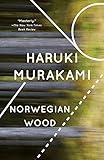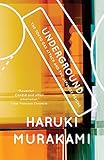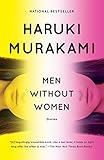If you’re looking for stories that turn the universal problems of isolation, happiness, and identity into bizarre and often mysterious adventures, look no further than Haruki Murakami books. Though strongly influenced by Western literature (famously by Franz Kafka and Raymond Chandler), Murakami’s work is expressly reflective of the Japanese culture, and perhaps that’s why his stories are so unique.
There isn’t a single conventional Murakami book, and their eccentricity sometimes demands several re-reads before you fully appreciate them. If you’ve been there, you’ll know: going into the world of Murakami’s writing is like falling down a rabbit hole that you cannot, and more importantly, do not want to, escape.
Ranking these enchanting works is a challenge, but after much thought, here’s our list of the best Haruki Murakami books so far.

1. Kafka on the Shore (2002)
Kicking off our list is a book comprised of two narratives: First, there’s Kafka Tamura, a teenage boy on a quest to find his long-lost mother and sister. Then there’s Nakata, an old simpleton who finds and returns lost cats to their owners. As they unravel, these two odysseys begin to intertwine and connect.
Upon first reading Kafka on the Shore, you might find the dual narratives a little confusing. But the further into the story you get, the more the duality will start to make sense, so do stick with it! It’s meant to be thought-provoking — Murakami himself said that the book is full of riddles, the answers to which are unique to you and your reading experience. Such a complex masterpiece, one of the best books ever written, cannot be anywhere other than the top of the list.

2. The Wind-Up Bird Chronicle (1995)
What starts out as an urban couple’s attempt to find their missing cat (perhaps Murakami had lost a cat himself?) turns into something other-worldly in this very popular novel. The Wind-Up Bird Chronicle was published in Japan as a trilogy and translated into English as a single book. From quirky characters to alternative realities, the plot of this Haruki Murakami book will surely leave you reeling.
On top of that, in what would become the typical Murakami style, the borderline crazy story poignantly flags up issues in Japanese society, such as alienation, self-discovery, and power. This novel marks Murakami’s spectacular inroad into deeper social commentary.

3. A Wild Sheep Chase (1982)
A Wild Sheep Chase is often recommended as a stepping stone for readers new to Murakami’s writing, because the story is less of a labyrinth than many of his others. But don’t be fooled: featuring an unnamed protagonist searching for an all-powerful sheep with a strange birthmark — and accompanied by a woman who possesses magically beautiful ears — this book remains far from ordinary.
This strange detective story is often regarded as Murakami’s first substantial work. The author agrees with this, describing the prequels to this book, his first two novels, as “flimsy.” Part of A Wild Sheep Chase’s brilliance is its balance between being complex and accessible, surrealist yet still readable, so that even those less used to Murakami’s strange style will enjoy it.

4. Norwegian Wood (1987)
It’s difficult to reach the end of the top five Murakami books without including the novel that catapulted him into international fame. Norwegian Wood is unlike the books discussed so far in the sense that it’s not surrealist. Instead, it’s a nostalgic story of a 30-something man reminiscing about his college life, his first love, and his grief for lost loved ones. Sounds strange for a Murakami novel, doesn’t it? But don’t be quick to disregard it — if anything, this tear-jerker is a true testament to the author’s shimmering eloquence.

5. Dance Dance Dance (1988)
Coming back to fast-paced and bizarre plotlines, we have Dance Dance Dance, the sequel to A Wild Sheep Chase — although both can be read on their own. Here, our still nameless protagonist returns to the place where he met the lady with the impossibly magnificent ears in the first installment, and where yet more mystery (involving murder, and a teenage girl who discusses death as if she’s talking about the weather) awaits him.
This is an exciting and fun read, one that provides readers with that classic-Murakami puzzling sensation, but isn’t as confounding as some of his later works. Written after the intensely emotional Norwegian Wood, it is apparently one of the books that Murakami enjoyed writing the most.

6. After the Quake (2000)
For short story lovers out there, this is a must-read collection from Murakami. The six stories in this collection show the author’s masterful exploration of the fragility of life, in the aftermath of the 1995 Kobe earthquake.
Unlike most of his other works, all six short stories are told in the third person. Similar to all his other works, reading and re-reading all these stories together will likely be the key of fully appreciating them.

7. Hard-Boiled Wonderland and the End of the World (1985)
As the title suggests, there are two parts to this book — a somewhat believable myth, and a surreal reality. Murakami’s rather peculiar style of telling two stories in tandem is used this time to marry sci-fi and dystopian elements with those of a detective story, in between which there is also a love story. It’s a feat, trying to combine so many genres into one work. It may seem like overkill, although when done right, as is the case with Hard-Boiled Wonderland and the End of the World, the outcome is a book that’s difficult to put down.

8. 1Q84 (2009-2010)
With the play on Orwell’s Nineteen Eighty-Four, you wouldn’t be wrong if you’d assumed that this is a dystopian novel. Indeed, 1Q84 comprised of three parts that can take some effort to read, given the intricacies of Murakami’s writing. Nonetheless, unlikely events, the collision of parallel worlds, and an impressive cast of unconventional characters — including the rare appearance of a female lead — will pull you along, letting you discover Japan’s religious sects and shifting social reality in the modern age.

9. Underground (1997-1998)
While still investigating the themes of alienation in a highly rational society, this nonfiction book takes us away from Murakami’s typical surrealist writing. Instead, we have a series of interviews with commuters and workers who were victims of Tokyo’s subway system terror attacks in 1995. Concluding it is a personal essay in which Murakami directly questions the nonchalance of Japanese society to such an event. While some critics say that it’s one-sided, Underground is still an interesting and in-depth work that demonstrates Murakami’s ability to delve into problems that are sometimes uncomfortable to explore.

10. Sputnik Sweetheart (1999)
To cap off our top ten is Sputnik Sweetheart, a story about attraction, desire and self-discovery. In this novel, the male protagonist must sit and watch while the girl of his dreams falls for a woman seventeen years her senior. The story progresses as the characters travel, go missing, and search for each other — as well as themselves. On top of his usual themes of dreams and disappearances, Murakami also explores themes of sexuality and the psychological turbulence of loving and losing. Even though the setting of this novel is less eccentric than others, Murakami doesn’t cease to amaze.

11. Colorless Tsukuru Tazaki and His Years of Pilgrimage (2013)
On another different but not unfamiliar note, Colorless Tsukuru Tazaki and His Years of Pilgrimage is about a 30-something man looking back at his teenage years, trying to understand why his childhood friends turned their backs on him. These years are chosen by Murakami for a reason — they’re perhaps the loudest, most emotionally vibrant years of one’s life, where the beauty and flaws of the world manifest themselves in unexpected ways. The book poetically portrays growing pains and undisguised human nature, although it lacks the poignancy that its brother, Norwegian Wood, has.

12. After Dark (2004)
After Dark is a story that follows two young sisters encountering love, desire, and the many layers of cosmopolitan life amidst the hustle and bustle of Tokyo. The surrealist flare is no doubt unmissable in this piece, although the plot is somewhat less expansive than some of the works listed above. Nonetheless, Murakami continues to perplex readers with this novel, leaving its ending and themes open to interpretation.

13. The Elephant Vanishes (1993)
This book is a collection of 17 short stories — one of which is now a chapter in The WInd-Up Bird Chronicle. Expect the usual atmosphere: bizarre, other-worldly, and potent. But also prepare yourself for humor — even if only because the stories are so absurd you can’t help but chuckle. If Murakami’s novels are confusing, what he pacts into several pages are even more difficult to unravel. Because of this, The Elephant Vanishes isn’t the breeziest read. But if you’re someone who enjoys stories that ask you to ponder bewildering imageries and to reflect on modern society, this is the book for you.

14. South of the Border, West of the Sun (1992)
Interestingly enough, many have commented on the autobiographical elements of South of the Border, West of the Sun — even though the protagonist is not very likeable. The protagonist is a man who is revisited by his childhood sweetheart many years after their adolescence had passed. It’s a story about life’s “what ifs” and the rippling effects that childhood experiences have on our lives. The way this book questions marital happiness and isolation in adult life is more direct than Murakami’s other works, which might sit better with some readers than with others.

15. Men Without Women (2014)
Whether or not this collection was named after Hemingway’s work is unknown, but there are certainly overlapping topics. Through either divorce or death, the men in the seven stories of this volume have lost someone. Combined with Murakami’s wondrous skill with a quill, the depiction of the men’s psychological battles and their struggles with problems that are often associated with women in the media (such as anorexia), make for an impactful book.

16. What I Talk About When I Talk About Running (2007)
For Murakami fans and aspiring surrealist writers, this is a must-read. You’ve probably wondered more than once about what goes on in Murakami’s mind — what happens in his days that inspire him to write such unbelievable narratives. There is likely no writing that can ever give a satisfactory answer to that elephantine question, but this memoir will give you a glimpse into his processes. As a bonus, you’ll get to learn a lot about long-distance running as well, since Murakami uses his journey with this sport as a metaphor to discuss his revelations.

17. Hear the Wind Sing (1973)
Like the debut novels of many great authors, this is not Murakami’s best work. There isn’t really a storyline, just the unfolding anecdotes of a university student returning to his hometown, reminiscing with his friends, and meeting odd characters. The incompleteness of the plot feels unlike the purposeful open endings of his later works. That being said, the skillful prose and non-traditional narratives that brought Murakami acclaim in later years is apparent from the get go. Both this and his second novel were only published limitedly outside of Japan, so it’ll be hard to get your hands on a copy now. Luckily, there’s an edition titled Wind/Pinball that combines the two printed in 2015.

18. Pinball, 1973 (1980)
It’s hard to discuss Hear the Wind Sing without discussing it’s sequel, about a disinterested man trying to rediscover himself by finding the old pinball machine he used to play. While you can definitely see Murakami’s progression in terms of the story and topic, Pinball still lacks the wow-factor of his later publications. It’s as if his writing is going through puberty and isn’t quite sure of itself yet. Nonetheless, there’s a melancholic and unconventional plot that awaits you in this novel.

19. Blind Willow, Sleeping Woman (2009)
Blind Willow, Sleeping Woman — Murakami’s longest short story collection — is comprised of 24 stories that cover the same themes of identity, loss, sexuality and loneliness. The fifth story, “The Mirror,” is definitely a standout and demonstrates that great stories don’t have to be moralistic, they just have to be reflective of important issues. And while this is an intriguing book overall, it lacks the adventurous quality of many other Haruki Murakami books.

20. The Strange Library (1983)
To wrap things up, we present the children’s novella,The Strange Library. We did tell you that Murakami never ceases to surprise, didn’t we? The plot follows a boy in a library that’s actually a maze he has to escape with the help of a sheep man. This wild premise is told simply, garnished with Murakami’s imagination and distinct style — a piece of writing that draws comparison with the works of Roald Dahl and Neil Gaiman. If there’s one Haruki Murakami book that anyone can read at any age and marvel at, it’s this one.
***
If you’re looking for more surreal reads in the style of Haruki Murakami, check out our guide to magical realism! Or if you’re looking to read more mind-bending short stories, head to our list of short stories that will change the way you think!